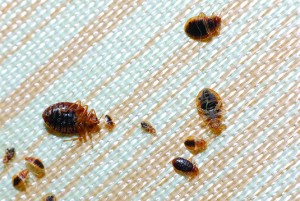
Cimex lectularius might be tiny, but they leave a big impact on your customers. Photo: courtesy of, and copyrighted by, Gene White, pmimages@earthlink.net
People who have been exposed to bed bugs pay a high price in more ways than one.
Experts reassure us bed bugs don’t spread disease, and imply they don’t harm people. However, does society really know what the negative health effects of bed bugs are? The answer depends on whom you ask.
Physical health costs
Most primary care physicians and even epidemiologists will respond with something like “Bed bugs have never been proven to transmit diseases to humans, even though they might carry many pathogens on their bodies.” They can reassure your clients that “No, bed bugs will not hurt you…” but the reality is, that’s not always the case.
Dermatologists, for example, may add the following facts:
⦁ Bed bugs are external parasites that feed exclusively on blood. To access blood, they might bite or pierce the skin.
⦁ Skin lesions from the initial bite might seem minor, but they’re often itchy. Scratching irritates the itching sensation even more and might eventually result in secondary infections.
⦁ The ultimate effects of itching and scratching open sores in the presence of heavy infestations of bed bugs and their fecal matter haven’t been determined.
What is known is the immediate health effects of bed bug bites vary widely, depending on a person’s immunological response. Prolonged exposure to bed bug infestations results in increased sensitivity by the individual. Severe discomfort and itching may occur.
Repeated bug bites over a period of several weeks might cause some people to become sensitized to bed bug bites resulting in ever-intensive allergic responses. Anaphylaxis, a severe allergic reaction, can sometimes follow.
Psychological health costs
Diminished physical health isn’t the only potential harm caused by bed bug infestations. Sociologists have described some of the mental and emotional costs. For many people, the prospect of being attacked by bloodthirsty parasites, especially at such a vulnerable time (asleep in bed) might evoke a terror. Mental anguish is often cited as a common experience in cases of bed bug infestations.
The social stigma and negative repercussions of being identified as a bed bug carrier can lead to many bizarre and self-destructive behaviors. Fear of being identified by peers as a carrier is a leading cause of extreme eradication measures and nonreports. When humans fear the consequences of reporting their infestation more than they fear the infestation, bed bugs spread.
Bed bug-infested individuals engage in destructive behaviors such as social distancing as a way of limiting the risk of infecting others. Individuals may decide not to attend social events, where contact with others is likely. They might believe their limited socialization will help curb the spread of bed bugs. Such self-imposed quarantines can be detrimental to a person’s sense of well-being and mental health and can exacerbate feelings of abandonment and depression.
Interestingly, even individuals who mistakenly thought their homes were infested even though they were not, showed increased depression and social distancing behaviors according to a study by Dr. Timothy Gibb.
Mental health costs
Psychologists also report a plethora of mental health costs associated with bed bugs in addition to mental anguish. These range from paranoia, sleep disturbance, insomnia, depression and hyper-vigilance to obsessive thoughts and even suicide.
Psychological symptoms seldom have a one-for-one correlation with causes, but having bed bugs is a stress that can exacerbate many symptoms. It’s clear physical and emotional harm caused by bed bugs can negativly affect relationships, employment and quality of life — things not commonly considered when tabulating the true cost of a bed bug infestation.
nbsp;
Financial costs
The exact cost of bed bugs requires property loss and damage be added to the list of expenses. Victims of bed bug infestations commonly discard real property to rid themselves of the pest.
Mattresses, box springs, bed frames and bedding are almost always the first to go into the trash. Upholstered chairs and couches follow closely behind. Clothing, luggage and other personal items that might have been stored near or under the bed quickly follow. Carpets are torn up, curtains are removed, baseboards and headboards are taken apart. In extreme cases, victims sell or simply abandon their homes, cars and furniture just to rid themselves of bed bugs.
All of these things carry a price tag. Add to that the cost of increased laundry and the resources devoted to bed bug eradication by everyone involved. In summary, financial losses are high.
The effect on society
Some bed bug researchers estimate that at the current rate the bed bug resurgence is occurring throughout the country, every person living in the United States will either have a personal encounter with bed bugs or will personally know someone who has. What remains to be seen is the effect that bed bugs will have on our society.
So the next time someone suggests bed bugs don’t cause harm, point them to these studies and to the many ways in which they can and do affect people’s lives.
Drs. Timothy Gibb and Ameya Gondhalekar are entomologists at Purdue University, West Lafayette, Ind.; Dr. Tyler Gibb teaches medical ethics, humanities and law at the Western Michigan School of Medicine, Kalamazoo, Mich. Contact them at PMPEditor@northcoastmedia.net.
Im a 20 year veteran of the Pest Management field, I have performed over 500 bedbug treatments, and I cant sleep regular anymore. Im lucky to get 2 hours any given night. Its not just the customer that suffers.